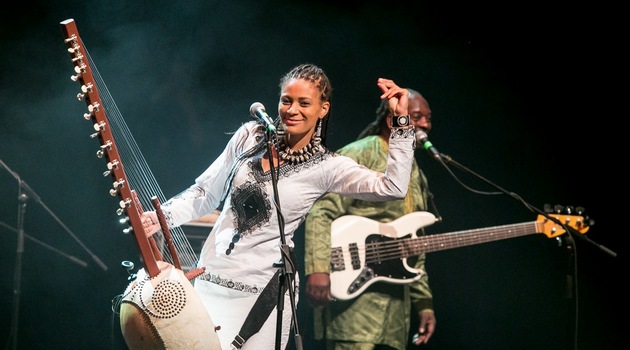
In the series on Mali music, I already wrote an article that explains the Kora, one of Africa’s unique, trademark instrument. It is a 21-stringed harp, one of the most important instruments belonging to the Manding peoples of West Africa (Gambia, Senegal, Mali, Guinea, and Guinea-Bissau). It belongs exclusively to griot families, and only those who are born into one of these families have the right to take up the instrument professionally. Oh yes, it’s for males only… well, in most of the cases. Sona Jobarteh, who was born into one of the five major Griot families, has become the first female to take up this instrument professionally in a male tradition that dates back over seven centuries. She is the first woman Kora virtuoso to come from a West African Griot family. Breaking away from tradition, she is a pioneer in an ancient male-dominated hereditary tradition that has been exclusively handed down from father to son for the past seven centuries. Reputed for her skill as an instrumentalist, distinctive voice, infectious melodies and her grace onstage, Sona has rapidly risen to international success following the release of her critically acclaimed album “Fasiya” (Heritage) in 2011.

Sora was born in London in 1983. She is the granddaughter of the Master Griot of his generation, Amadu Bansang Jobarteh, who migrated from Mali to the Gambia. Her cousin is the well-known, celebrated Kora player Toumani Diabate. She has studied the Kora since the age of three, at first taught by her brother Tunde Jegede, and then by her father, Sanjally Jobarteh. She gave her first performance at London’s Jazz Café when she was four years old. She studied piano, harpsichord, and cello at the Royal College of Music, and after that, composition at the Purcell School of Music. Sora has collaborated with musicians from all around the world, including Oumou Sangaré, Toumani Diabaté, Kasse Made Diabaté, the BBC Symphony Orchestra, Damon Albarn, the Irish Chamber Orchestra, and others. Jobarteh made her debut as a film composer in 2009 when she created the soundtrack to a unique documentary film on Africa entitled “Motherland.” To create this film score, Sona explored instruments in different ways to that of their traditional setting. She has used the Kora as a bass instrument as well as tuning it to an "Arabic" scale and has used the Guitar to emulate the sound of an African lute. She invented a new instrument called the Nkoni for use in many of the compositions in order to capture a unique sound. This instrument is a cross between the Kora and the Donso Ngoni, expanding the tonality and mood of the African musical sonic. Jobarteh's vocal style draws on the West African Griot style, although there are aspects that also lean towards East African influences.
Read previous articles:
THE MUSIC OF MALI VOL.8 - ROKIA TRAORE
THE MUSIC OF MALI VOL.7 - MOREY KANTE
THE MUSIC OF MALI VOL.6 - SALIF KEITA
THE MUSIC OF MALI VOL.5 - INDEPENDENCE AND REVIVAL
THE MUSIC OF MALI VOL.4 - OTHER INSTRUMENTS
THE MUSIC OF MALI VOL.3 - OTHER CALABASH HARPS
THE MUSIC OF MALI VOL.2 - THE KORA
THE MUSIC OF MALI VOL.1 - THE GRIOTS



